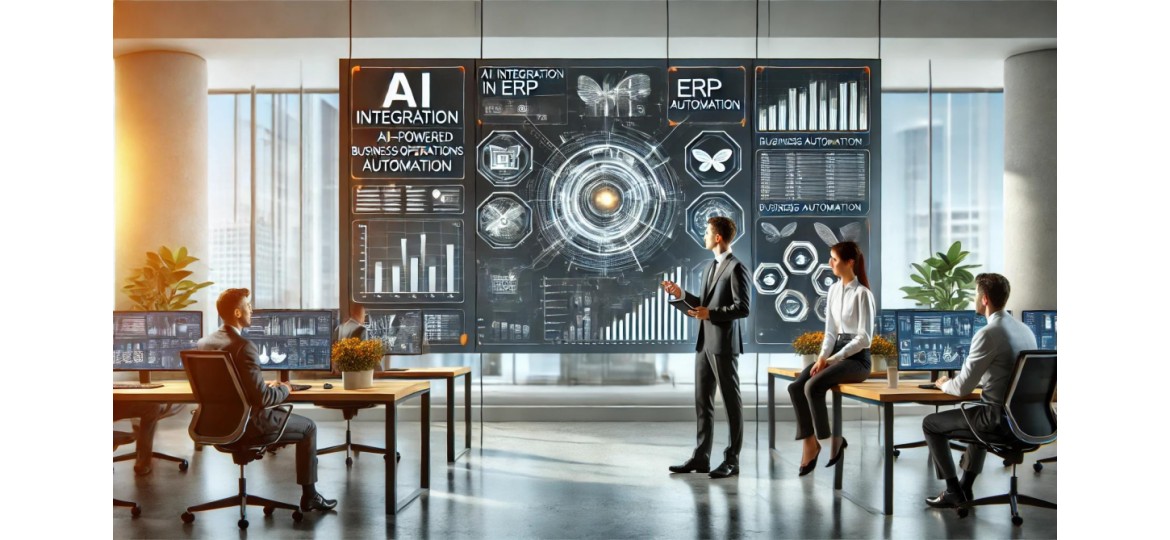Benefits and Challenges of AI Integration in ERP for Business Process Automation

The integration of Artificial Intelligence (AI) into Enterprise Resource Planning (ERP) systems is now achievable thanks to technological advancements. AI not only helps optimize business processes but also enhances operational efficiency and boosts overall productivity. Below is an in-depth explanation of how AI integration into ERP can automate business operations.
What is ERP and How Does AI Contribute?
ERP is a system designed to help companies manage various operational aspects, such as financial management, human resources, logistics, and supply chain processes. In the digital era, integrating AI into ERP allows companies to refine these processes through advanced data analysis. AI can process large amounts of data, provide deep insights, and automate tasks that previously required manual effort.
Benefits of AI Integration in ERP
Here are some of the key benefits companies can achieve by integrating AI into their ERP systems:
1. Automation of Repetitive Tasks
One significant advantage of integrating AI into ERP is its ability to automate time-consuming repetitive tasks. For instance, tasks like data entry, order processing, and inventory management can be streamlined through AI. Automation not only saves time but also minimizes the risk of human errors.
2. Improved Inventory Management
AI-integrated ERP systems enhance inventory management by analyzing historical data and market demand to predict future stock requirements. This prevents overstocking or stock shortages, optimizing costs and improving customer satisfaction.
3. Data-Driven Decision-Making
AI processes vast amounts of data and provides comprehensive analysis. With AI, companies can make more accurate decisions based on real-time data. These insights are crucial for stock management, financial planning, and supply chain optimization.
4. Enhanced Forecasting and Planning
AI's predictive capabilities are exceptional. Within ERP systems, AI helps companies anticipate market trends, customer needs, and potential supply chain disruptions. This enables better strategic planning and preparedness for future changes.
5. Higher Operational Efficiency
AI integration in ERP significantly improves operational efficiency. AI assists with human resource management, financial automation, and production management, ensuring all business operations are smoother and more coordinated.
6. Personalized Customer Service
AI-powered ERP systems enable companies to improve customer satisfaction by offering more personalized services. By leveraging customer data, AI can help recommend relevant products, design targeted marketing campaigns, and enhance customer interactions, fostering stronger relationships and customer loyalty.
7. Enhanced Customer Experience
The integration of AI in ERP not only focuses on internal efficiency but also improves customer experiences. Companies can use AI to offer personalized recommendations based on customer interests or provide more responsive support through AI-powered chatbots.
8. Continuous Innovation
AI integration drives continuous innovation by analyzing real-time data and identifying areas for improvement. This enables companies to adapt their products or services to evolving market demands.
Example: AI in Financial Automation
One practical example of AI integration into ERP for business process automation is in financial management. Managing financial reports can be time-consuming and error-prone.
With AI, tasks such as bank reconciliations, invoice management, and financial reporting can be automated. AI recognizes patterns in financial transactions, identifies potential issues, and offers quick solutions.
Why Choose Soltius for AI-Driven ERP Solutions?
Elevate your business efficiency with AI-powered ERP solutions from Soltius. Equipped with cutting-edge technology and customizable solutions, Soltius helps companies optimize every aspect of their operations. Contact Soltius today for more information.
Conclusion
Integrating AI into ERP for business process automation brings numerous advantages, such as automating repetitive tasks and enabling data-driven decisions. AI helps companies enhance operational efficiency and stay competitive in today’s fast-paced market.
Other News


